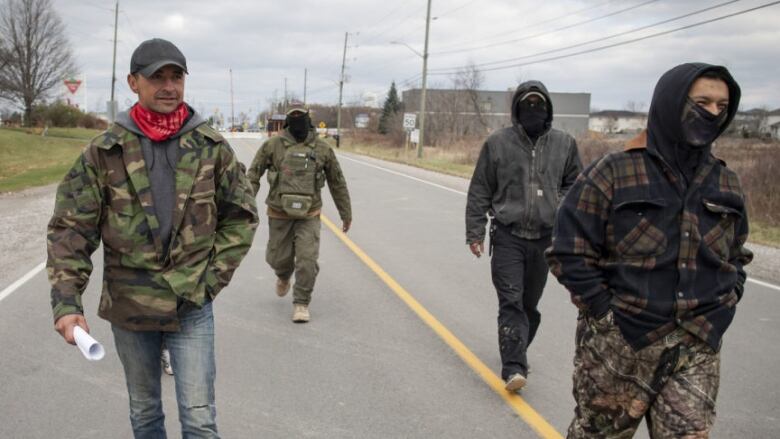Land Back movement leader flagged by police as 'violent'
'That is not me,' says Skyler Williams

Police flagged a prominent Haudenosaunee leader of the Land Back movement as "violent," according to court records from a recent RCMP operation to clear barricades from a road in northern B.C.
Skyler Williams was one of 30 people arrested over two days last week along the Morice River Forest Service Road, which stems from Houston, B.C., about 1,000 kilometres north of Vancouver.
It was the third police operation in as many years against barricades aimed at stopping construction of the Coastal GasLink (CGL) pipeline, which would carry natural gas to a $40 billion export terminal on the coast.
The RCMP ran Williams' name through two national police databases — the Police Records Information Management Environment (PRIME) database and the Canadian Police Information Centre (CPIC) — and found he was flagged as "violent" and an "escape risk," according to an affidavit filed by the RCMP with B.C. court.
It is not clear which police force flagged him, when or why.
Williams denies the allegation.
"The only days that any violence has ever come is from people with guns on their hips and badges on their chests," he told CBC News in a phone interview.
"And that is not us being violent, that has never been us being violent in any way shape or form. That is not me."
Williams has, over the years, faced several non-violent charges over land conflicts involving the people of his Haudenosaunee community of Six Nations reclaiming land. He pleaded guilty to one non-violent charge in 2008.
He is also currently facing non-violent charges including mischief and breaching an injunction from the Ontario Provincial Police (OPP) for his involvement with a successful battle to shut down a housing development in Caledonia, Ont.
WATCH | Footage of the RCMP raid:
Williams said the red flag on his name is not only wrong, but puts his life in danger.
"It heightens the risk for us. Anytime we get pulled over, you don't know what the police interaction is going to be like," he said.
"This is typical of what happens to Indigenous resistance in this country."
The RCMP did not respond to a request for comment.
Williams, a spokesperson for the 1492 Land Back movement, travelled to Wet'suwet'en territory to support the hereditary chiefs years-long CGL opposition with a handful of other Haudenosaunee from Six Nations, near Hamilton, and Akwesasne, which sits on the Canada-U.S. border about 120 kilometres west of Montreal.
PRIME contains information from police investigations including, "birth dates, telephone numbers, addresses," according to the affidavit, while CPIC has criminal record information, wanted and missing persons data along with drivers license and motor vehicle information records.
Police services from across the country feed into these databases.
The affidavits also said that some of those who were arrested, despite having no criminal records, came back with database hits for police interactions in other parts of the country.
All of them had their names run through PRIME and CPIC. It wasn't always clear in the affidavits which databases produced some of these hits.
That raises "all kinds of questions about surveillance and data sharing and how these surveillance practices lead to the criminalization of land defenders," said Jeffrey Monaghan, assistant professor at Carleton University's Institute of Criminology and Justice, who co-wrote a book on policing and Indigenous movements.
CGL has the support of 20 First Nation elected band councils along the project route. The Wet'suwet'en First Nation issued a statement condemning the barricades.
The hereditary chiefs assert authority over 22,000 square kilometres of the nation's traditional territory, an area recognized as unceded by the Supreme Court of Canada in a 1997 decision.
With files from Betsy Trumpener


